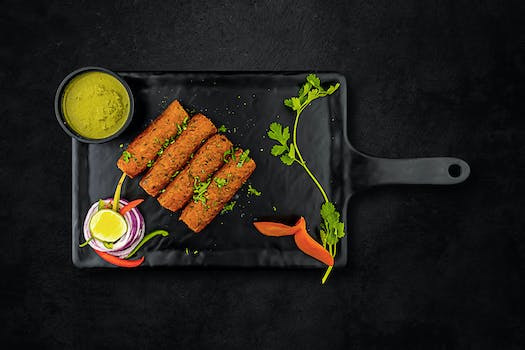

-
Table of Contents
"10 Dietary Habits: Nourish Your Way to a Longer Life"
Introduction
Introduction:
Maintaining a healthy diet is crucial for promoting longevity and overall well-being. By adopting certain dietary habits, individuals can enhance their chances of living a longer and healthier life. In this article, we will explore ten dietary habits that have been associated with longevity. These habits encompass a balanced and varied diet, emphasizing nutrient-rich foods, and avoiding excessive consumption of unhealthy substances. By incorporating these habits into your daily routine, you can take proactive steps towards achieving a longer and more fulfilling life.
The Importance of a Balanced Diet for Longevity
A balanced diet is crucial for maintaining good health and longevity. The food we consume provides us with the necessary nutrients and energy to function properly. It is important to develop healthy dietary habits that promote a longer and healthier life.
First and foremost, it is essential to consume a variety of foods from different food groups. This ensures that we obtain a wide range of nutrients that are necessary for our body's optimal functioning. Fruits, vegetables, whole grains, lean proteins, and healthy fats should all be included in our daily diet.
In addition to variety, portion control is another important aspect of a balanced diet. Overeating can lead to weight gain and obesity, which are associated with numerous health problems such as heart disease, diabetes, and certain types of cancer. By practicing portion control, we can maintain a healthy weight and reduce the risk of developing these chronic diseases.
Furthermore, it is important to limit the consumption of processed and sugary foods. These foods are often high in calories, unhealthy fats, and added sugars, which can contribute to weight gain and increase the risk of developing chronic diseases. Instead, opt for whole, unprocessed foods that are rich in nutrients and low in added sugars.
Another dietary habit that promotes longevity is staying hydrated. Water is essential for our body's proper functioning, and dehydration can lead to various health problems. Aim to drink at least eight glasses of water per day and limit the consumption of sugary beverages such as soda and juice.
In addition to what we eat, how we eat is also important. It is crucial to practice mindful eating, which involves paying attention to our body's hunger and fullness cues. This helps prevent overeating and promotes a healthier relationship with food.
Furthermore, it is important to eat slowly and chew our food thoroughly. This allows our body to properly digest the food and absorb the nutrients. Eating too quickly can lead to indigestion and overeating.
Incorporating physical activity into our daily routine is another important aspect of a balanced diet for longevity. Regular exercise helps maintain a healthy weight, strengthens our muscles and bones, and reduces the risk of chronic diseases. Aim for at least 150 minutes of moderate-intensity exercise per week, such as brisk walking or cycling.
Additionally, it is important to limit the consumption of alcohol. Excessive alcohol consumption can lead to liver damage, heart problems, and an increased risk of certain types of cancer. If you choose to drink alcohol, do so in moderation, which means up to one drink per day for women and up to two drinks per day for men.
Lastly, it is important to avoid smoking and limit exposure to secondhand smoke. Smoking is a leading cause of preventable diseases and premature death. It increases the risk of lung cancer, heart disease, stroke, and numerous other health problems. Quitting smoking is one of the best things you can do for your health and longevity.
In conclusion, a balanced diet is essential for a longer and healthier life. By incorporating these dietary habits into our daily routine, we can promote optimal health, maintain a healthy weight, and reduce the risk of chronic diseases. Remember to eat a variety of foods, practice portion control, limit processed and sugary foods, stay hydrated, practice mindful eating, incorporate physical activity, limit alcohol consumption, avoid smoking, and prioritize your health for a longer and happier life.
Top 10 Foods to Include in Your Diet for a Longer Life

Eating a healthy diet is essential for maintaining good health and increasing longevity. The foods we consume play a crucial role in our overall well-being and can significantly impact our lifespan. By incorporating certain foods into our daily diet, we can enhance our chances of living a longer and healthier life. In this article, we will explore the top 10 foods that you should include in your diet for a longer life.
1. Leafy Greens: Leafy greens such as spinach, kale, and Swiss chard are packed with essential nutrients like vitamins A, C, and K, as well as minerals like calcium and iron. These greens are also rich in antioxidants, which help protect our cells from damage and reduce the risk of chronic diseases.
2. Berries: Berries, such as blueberries, strawberries, and raspberries, are not only delicious but also incredibly nutritious. They are loaded with antioxidants, fiber, and vitamins that can help lower the risk of heart disease, improve brain function, and promote healthy aging.
3. Fatty Fish: Fatty fish like salmon, mackerel, and sardines are excellent sources of omega-3 fatty acids. These healthy fats have been shown to reduce inflammation, lower the risk of heart disease, and improve brain health. Including fatty fish in your diet at least twice a week can have significant benefits for your overall health.
4. Nuts and Seeds: Nuts and seeds are packed with nutrients, including healthy fats, fiber, vitamins, and minerals. They are also rich in antioxidants and can help reduce inflammation in the body. Incorporating a variety of nuts and seeds, such as almonds, walnuts, chia seeds, and flaxseeds, into your diet can provide numerous health benefits.
5. Whole Grains: Whole grains, such as brown rice, quinoa, and whole wheat bread, are an excellent source of fiber, vitamins, and minerals. They can help lower the risk of heart disease, type 2 diabetes, and certain types of cancer. Choosing whole grains over refined grains can have a significant impact on your health and longevity.
6. Legumes: Legumes, including beans, lentils, and chickpeas, are rich in fiber, protein, and various vitamins and minerals. They are also low in fat and can help lower cholesterol levels, reduce the risk of heart disease, and promote healthy digestion. Adding legumes to your diet can be a great way to improve your overall health and increase your lifespan.
7. Olive Oil: Olive oil is a staple in the Mediterranean diet, which is known for its numerous health benefits. It is rich in monounsaturated fats, which can help lower cholesterol levels and reduce the risk of heart disease. Using olive oil as your primary cooking oil and dressing can be a healthy choice for a longer life.
8. Yogurt: Yogurt is a great source of probiotics, which are beneficial bacteria that promote a healthy gut. A healthy gut is essential for overall health and can help boost the immune system, improve digestion, and reduce the risk of certain diseases. Including yogurt in your diet can have a positive impact on your longevity.
9. Garlic: Garlic has been used for centuries for its medicinal properties. It contains compounds that have been shown to reduce inflammation, lower blood pressure, and improve cholesterol levels. Adding garlic to your meals can not only enhance the flavor but also provide numerous health benefits.
10. Green Tea: Green tea is rich in antioxidants called catechins, which have been shown to have anti-aging and disease-fighting properties. Drinking green tea regularly can help reduce the risk of heart disease, certain types of cancer, and improve brain function.
In conclusion, incorporating these top 10 foods into your diet can have a significant impact on your longevity. Leafy greens, berries, fatty fish, nuts and seeds, whole grains, legumes, olive oil, yogurt, garlic, and green tea are all packed with essential nutrients and can help reduce the risk of chronic diseases. By making these dietary habits a part of your daily routine, you can increase your chances of living a longer and healthier life.
How to Incorporate Healthy Eating Habits into Your Daily Routine
Eating healthy is not just about losing weight or looking good; it is about nourishing your body and ensuring a longer, healthier life. Incorporating healthy eating habits into your daily routine is essential for overall well-being. Here are ten dietary habits that can help you achieve a longer and healthier life.
Firstly, it is important to start your day with a nutritious breakfast. This meal provides the energy and nutrients needed to kickstart your day. Opt for whole grains, fruits, and lean proteins to keep you full and energized throughout the morning.
Next, make sure to include a variety of fruits and vegetables in your diet. These colorful foods are packed with vitamins, minerals, and antioxidants that help protect your body against diseases. Aim for at least five servings of fruits and vegetables each day.
In addition to fruits and vegetables, whole grains should also be a staple in your diet. Whole grains such as brown rice, quinoa, and whole wheat bread are rich in fiber, which aids digestion and helps maintain a healthy weight.
Another important habit is to limit your intake of processed foods. These foods are often high in unhealthy fats, sugars, and sodium, which can increase the risk of heart disease, obesity, and other health problems. Instead, opt for whole, unprocessed foods whenever possible.
Furthermore, it is crucial to stay hydrated throughout the day. Water is essential for maintaining bodily functions, regulating body temperature, and flushing out toxins. Aim to drink at least eight glasses of water daily, and limit your intake of sugary beverages.
Incorporating lean proteins into your meals is also vital for a healthy diet. Lean proteins such as chicken, fish, tofu, and legumes provide essential amino acids that help build and repair tissues. They also keep you feeling full and satisfied.
Additionally, it is important to watch your portion sizes. Overeating can lead to weight gain and increase the risk of chronic diseases. Use smaller plates and bowls, and listen to your body's hunger and fullness cues to avoid overeating.
Moreover, it is crucial to practice mindful eating. Slow down and savor each bite, paying attention to the flavors, textures, and smells of your food. This helps you become more aware of your body's hunger and fullness signals, preventing overeating.
Another habit to incorporate into your daily routine is to plan and prepare your meals in advance. This allows you to make healthier choices and avoid relying on unhealthy fast food or takeout options. Plan your meals for the week, make a grocery list, and prepare meals in batches to save time and ensure a nutritious diet.
Lastly, it is important to enjoy your meals in a stress-free environment. Stress can negatively impact digestion and lead to unhealthy eating habits. Create a calm and relaxing atmosphere during mealtime, and avoid distractions such as television or electronic devices.
In conclusion, incorporating healthy eating habits into your daily routine is essential for a longer and healthier life. Start your day with a nutritious breakfast, include a variety of fruits and vegetables, and opt for whole grains and lean proteins. Limit your intake of processed foods, stay hydrated, and watch your portion sizes. Practice mindful eating, plan and prepare your meals in advance, and enjoy your meals in a stress-free environment. By following these ten dietary habits, you can nourish your body and achieve optimal health.
Q&A
1. What are some dietary habits for a longer life?
- Consuming a balanced diet rich in fruits, vegetables, whole grains, lean proteins, and healthy fats.
- Limiting the intake of processed foods, sugary beverages, and excessive salt.
- Drinking plenty of water and staying hydrated.
- Moderating alcohol consumption.
- Eating smaller portion sizes and practicing mindful eating.
- Including regular physical activity in your routine.
- Avoiding smoking and tobacco products.
- Limiting the intake of red and processed meats.
- Incorporating fermented foods for gut health.
- Seeking professional guidance for personalized dietary recommendations.
2. How can a balanced diet contribute to a longer life?
- A balanced diet provides essential nutrients, vitamins, and minerals necessary for optimal bodily functions.
- It helps maintain a healthy weight, reducing the risk of chronic diseases such as heart disease, diabetes, and certain cancers.
- A balanced diet supports a strong immune system, reducing the likelihood of infections and illnesses.
- It promotes healthy digestion and gut health, which is linked to overall well-being.
- Consuming a variety of foods ensures a diverse nutrient intake, supporting overall health and longevity.
3. Why is it important to limit processed foods and sugary beverages for a longer life?
- Processed foods often contain high levels of unhealthy fats, added sugars, and sodium, which can contribute to weight gain and increase the risk of chronic diseases.
- Sugary beverages are typically high in calories and offer little to no nutritional value, leading to weight gain and an increased risk of conditions like obesity, type 2 diabetes, and heart disease.
- By limiting processed foods and sugary beverages, individuals can reduce their intake of harmful additives, excessive calories, and refined sugars, promoting better overall health and longevity.
Conclusion
In conclusion, adopting healthy dietary habits can significantly contribute to a longer and healthier life. These habits include consuming a balanced diet rich in fruits, vegetables, whole grains, and lean proteins, while limiting processed foods, sugary beverages, and excessive salt intake. Additionally, maintaining proper hydration, practicing portion control, and avoiding overeating are crucial. Regularly consuming probiotics, reducing alcohol consumption, and limiting red meat intake can also promote longevity. Lastly, incorporating regular physical activity and avoiding smoking are essential for overall well-being and a longer lifespan.












